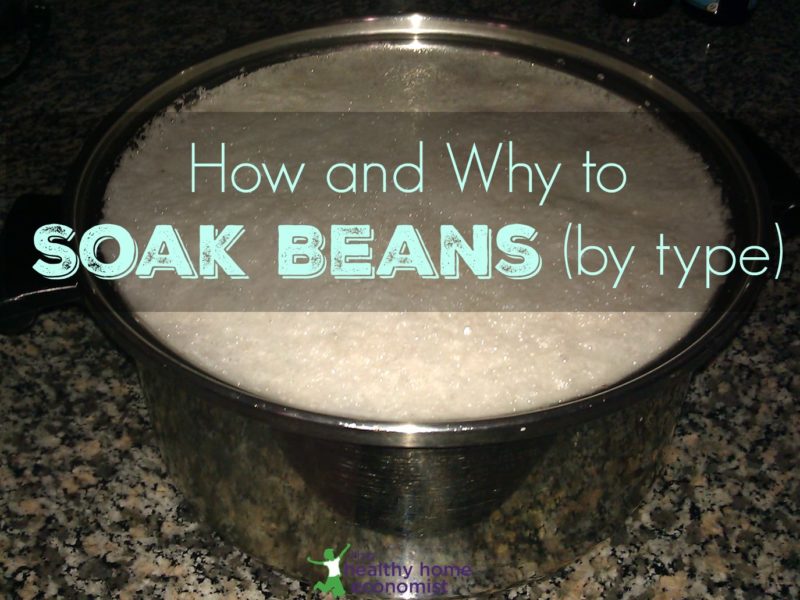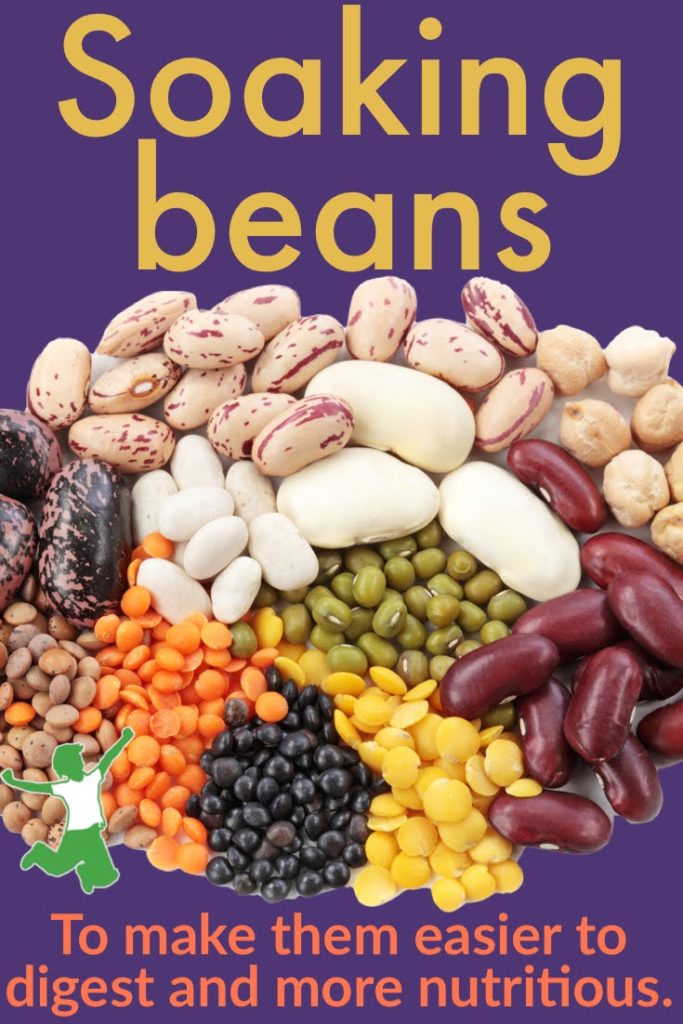Table of Contents[Hide][Show]
The simple overnight process of how to soak beans (by type) will help to eliminate gas and intestinal issues so you can enjoy eating these nutritious plant foods again!

I went on a bean soaking binge this past weekend, and the amount of scum that came to the top of the large pot of soaking kidney beans was so huge, I thought it deserved its own blog post. Soaking beans for many hours before cooking them produces a lot of scum which is course, is rinsed and drained away when the soaking is complete.
What is all that scum anyway? Anti-nutrients, that’s what! And those anti-nutrients such as phytic acid, lectins, and enzyme inhibitors are going to be in your gut causing you gas, heartburn, reflux, and whatever other digestive ills beset you when you eat something that isn’t particularly digestible unless you soak your beans before cooking them.
Traditional cultures took great care to prepare their legumes with a long soak before cooking to enhance digestibility and nutrient absorption.
I love Mexican food but really try to avoid Mexican restaurants for this reason .. they don’t soak their beans before cooking them!
After a meal at a Mexican restaurant, I will typically feel very bloated. Eating the same meal prepared at home where I soaked the beans properly before cooking results in no digestive upset whatsoever.
Take the Soaked Beans Challenge!
If you think unsoaked beans don’t cause you any trouble .. take this challenge. Soak beans next time before cooking and notice the difference in your stomach after eating.
You may think that the unsoaked beans don’t cause you any trouble, but you just may find that soaked beans are infinitely more filling and that you eat less and enjoy the meal more as a result!
Traditional peoples were very wise in the preparation of their foods. They not only selected nutritious foods but they prepared them for maximum digestibility and nutrition.
What good is eating nutritious legumes if the body is so whacked by the anti-nutrients that it can’t very easily extract and digest the nutrition?
So, the next time you make your beans, make sure you soak them first!
I soak large pots of various types of beans every month or so and then cook them – freezing for easy, quick meals when beans are required like homemade chili.
**If you absolutely do not have time to do this, at least buy pre-soaked legumes and beans packed in glass jars. Your digestion will thank you!
How To Prepare Beans by Soaking (video tutorial)
If you’ve never soaked beans before, it’s so easy. It’s a very similar process to soaking nuts. The method also mimics the wisdom of traditional societies that soaked seeds.
See this short video below that demonstrates the simple process.
Kidney shaped beans
For kidney shaped beans and dried/split peas, put a pinch of baking soda and enough water to cover in a large pot and soak uncovered for 12-24 hours. Drain, rinse and cook as usual.
Examples of kidney-shaped beans include:
- Red kidney beans
- White kidney beans (cannellini beans)
- Pinto beans
- Anasazi beans
- Black-eyed beans (black-eyed peas)
- Great Northern beans
- Lima beans
Non-kidney shaped beans (and other legumes)
For more oval-shaped beans and other legumes, soak for 12-24 hours in filtered water to cover plus 1 tablespoon of cider vinegar or lemon juice for every cup of dried beans/legumes used.
A homemade apple cider vinegar recipe or store-bought are both fine (make sure the ACV is packed in glass). Liquid whey from yogurt, kefir, or clabbered milk may also be used. Drain, rinse, and cook as usual.
Examples of non-kidney shaped beans include:
- Black beans (turtle beans)
- Navy beans
- Fava beans
- Adzuki beans
- Chickpeas
- Lentils
For maximum digestibility, it is best to rinse and refresh the filtered water and baking soda or the acidic medium once or twice during the soaking period. If you forget, no worries.
I try to always soak beans for the full 24 hours instead of just overnight. Sometimes if I get busy, I might even soak them 36 hours, but this is risky as they can get moldy sometimes if you go over 24 hours. Best to stay between 12-24 hours particularly during summer months.
How to Cook Beans After Soaking
After soaking, be sure to thoroughly drain and rinse the beans until all the scum is washed away. Then, complete the process by doing the following.
- Fill the pot of rinsed pre-soaked beans with fresh filtered water, bring to a boil, and skim away any additional foam that may come to the top at the start of the boil.
- Turn down the heat to a simmer, add 4 crushed garlic cloves, and cook until the beans are soft (about 4 hours).
- Drain beans and add to your favorite dish or let cool and freeze in large freezer bags for quick meals at a later date!
You won’t be needing over-the-counter gas meds after preparing beans the traditional way!
Should You Use the Soaking or Cooking Water?
Some alternative cooking circles advocate using the soaking or bean cooking water. Unfortunately, neither of these practices is traditional.
Using the cooked bean water or aquafaba is actually a dangerous practice. See the linked article for reasons to avoid this modern food especially during pregnancy!
Other Types of Legumes
This article plus video on soaking lentils provide additional information specifically for this legume. Because they are soaked exactly the same as all non-kidney shaped beans, it is helpful for visual learners.
Lentils were the favorite of nutritional pioneer Dr. Weston A. Price due to their very high potassium content.
Recipes Using Pre-soaked Beans and Legumes
Here are some recipes to try using soaked beans and other legumes to entice you!









Thank you for this great article! Have you ever read Bean by Bean by Crescent Dragonwagon? I only read the intro a few years back, but she suggested that soaking and cooking in a large amount of water also helps with digestion, allowing more of the oligosaccharides to wash away in the soaking/cooking water. Do you know if the amount of water actually makes a difference?
Also, do you know how pressure cooking affects beans? I have an InstantPot, and only a couple times I cooked unsoaked beans in it when I had forgotten and had only a couple hours until dinner. They seemed to not affect my family’s digestion, and I’m wondering if there is some sort of science behind that.
Thanks in advance for your answers to these questions!
thank you very much for the good lesson on soaking beans before cooking,
Happy new year 2021
Never use aluminum pots for any reason.
After soaking beans, drain and rinse, bring beans to a boil, remove, drain and rinse again, add new water, cook. Bloating is greatly reduced.
Hi Sarah! Does one re-add the Acv or baking soda after each rinse of the beans? Or do you then say, that they reaped the benefits already and only need filtered water from there? Thanks
Yes, the article states to rinse and refresh the water and baking soda or acidic medium once or twice if you can. If not, no worries.
Hi Sara,
I soaked some navy beans in 2 inches of water for about 14 hours, then boiled them for 35 minutes which made them the texture I like. The odor of the soaking and fresh water I used to boil them though, it is stanching up my drain [retty bad. I put some baking soda down the drain, cause yuck, it has not helped much yet. Do you think there is a problem with the beans? I refrigerated them after cooking last night…I have noticed the same odor when opening a container of cooked beans before but I don’t recall it being this bad on cooking. Do you have a recommendation about how long to keep cooked beans in the fridge?
Two inches of water doesn’t sound like much. Did you cover them generously with water during soaking?
Any cooked food should only be refrigerated a few days.
I cook/boil alubia beans (the baked beans type) and I thinks it’s better in a clay pot. Am I right?
Cooking in clay does seem to result in better tasting food. I use slow cooking clay pots myself.
My farm CSA gave us fresh Fava and chickpeas. Like still in the pod, still on the bush fresh. Do I need to do a long dry in the sun and then start the soaking process? Or start soaking from fresh?
You can soak them fresh.
I didn’t eat many beans for the majority of my life because they gave me gas and made me bloat. I also think I burnt on the stove top just as many as I managed to cook successfully. What a pain! The soaking overnight and into the following afternoon, just to burn them!!! Then one day I said, “hey, why aren’t I cooking these things in a slow cooker?” So, without soaking at all, just rinsing clean, I’ve been putting several cups of beans on at night before going to bed, covering with a lot of water, and in the morning, viola!, perfect beans! And no gas to boot! It seems so silly now when I hear people talk about preparing beans, soaking, cooking on the stove, etc. Make it easy on yourselves, folks, and just invest in a cheap slow cooker that fits the size of your family. A 5-6 quart is good for a family of five. It’ll beautifully cook 3-4 cups of dry beans. AND, I don’t worry about phytates…at all because my diet is diverse in nutrient-dense plant foods. Aside from being a powerful antioxidant, as Dr Weil says, “phytates themselves have some health benefits, including anti-inflammatory effects. In laboratory research, phytates have helped normalize cell growth and stopped the proliferation of cancer cells. They also may help prevent cardiovascular disease and lower a food’s glycemic load.”
I soaked beans overnight and by morning most of the water was absorbed. It says just cover. I’m not ready to cook yet. Do I add more water? Also, should I refrigerate? I read somewhere if you leave on the counter you will start growing mold.
Yes you will need to add more water. You only leave it on the counter at most 24-48 hours or it will definitely start molding. If your house is warm, no longer than 24 although an overnight soak is sufficient to make them digestible enough for most people.
I am wanting to pressure can black beans and kidney beans. Do I soak them before I can them?
Yes, that would be most ideal.